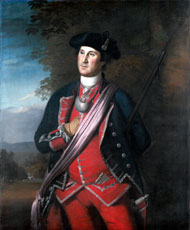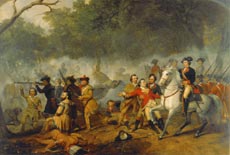 |

Early Military Career
|
 |


EARLY MILITARY CAREER
 |
 |

Washington as Colonel of the Virginia Regiment by Charles
Willson Peale, 1772
Washington-Custis-Lee Collection, Washington and Lee University, Lexington, Virginia
|
 |
Colonial officials, concerned about French sorties into Virginia territory, send Washington, a major in the Virginia militia, to the Allegheny River Valley.
Told by the French that they intend to stay, Washington makes an epic 300-mile journey through the wilderness to report the crisis. Reports of his trek make him as much a hero in London as in the colonies
|
 |
Washington, promoted to colonel, leads 300 men against the French at Fort Duquesne (now Pittsburgh, PA).
On his way, he builds what he calls Fort Necessity, near what is now Confluence, PA. The fort falls to the French in a skirmish that will lead to the French and Indian War. A London gazette, publicizing his heroism, prints a line from a Washington letter: “I have heard the bullets whistle; and believe me, there is something charming in the sound.”
|
 |
Washington has two horses shot from under him during a battle in which British Gen. Edward Braddock is killed and the British are routed.
“I escaped unhurt, although death was leveling my companions on every side of me,” Washington writes his mother. A minister suggests that Providence had preserved Washington “in so signal a manner for some important service to his country.” At age 23, he becomes commander of all the Virginia troops.
|
 |
 |

Washington as Captain in the French and Indian War by Junius Brutus Stearns, oil on canvas, circa 1849-1856
Virginia Museum of Fine Arts
|
 |
Washington’s men fight in a British force that defeats the French and captures Fort Duquesne.
Appalled by politicians’ failure to support the war, he resigns and returns to Mount Vernon. His officers write of their regret for the loss of “such an excellent Commander, such a sincere Friend, and so affable a Companion.” He is elected to the Virginia House of Burgesses, in which he will serve until it is dissolved in 1774.
|
 |
He marries Martha Dandridge Custis, a widow, and assumes paternal care of her children, Martha (“Patsy”) and John Parke (“Jacky”).
He and Martha never have any children of their own. He later will cite this when he points out that, as President, he cannot launch a dynasty.
|
 |
The Treaty of Paris, which ends the French and Indian War, grants the British all French territory east of the Mississippi River.
To finance the war, England had levied taxes on the colonists. Resentment over taxation finally led to revolution. It had started, a British statesman later wrote, with Washington’s first skirmish against the French: “The volley fired by a young Virginian in the backwoods of America set the world on fire.”
|

| | | | | |
 |
|




